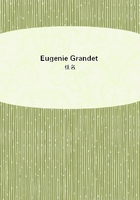
第3章
Monsieur Grandet thus obtained that modern title of nobility which our mania for equality can never rub out. He became the most imposing personage in the arrondissement. He worked a hundred acres of vineyard, which in fruitful years yielded seven or eight hundred hogsheads of wine. He owned thirteen farms, an old abbey, whose windows and arches he had walled up for the sake of economy,--a measure which preserved them,--also a hundred and twenty-seven acres of meadow-land, where three thousand poplars, planted in 1793, grew and flourished; and finally, the house in which he lived. Such was his visible estate; as to his other property, only two persons could give even a vague guess at its value: one was Monsieur Cruchot, a notary employed in the usurious investments of Monsieur Grandet; the other was Monsieur des Grassins, the richest banker in Saumur, in whose profits Grandet had a certain covenanted and secret share.
Although old Cruchot and Monsieur des Grassins were both gifted with the deep discretion which wealth and trust beget in the provinces, they publicly testified so much respect to Monsieur Grandet that observers estimated the amount of his property by the obsequious attention which they bestowed upon him. In all Saumur there was no one not persuaded that Monsieur Grandet had a private treasure, some hiding-place full of louis, where he nightly took ineffable delight in gazing upon great masses of gold. Avaricious people gathered proof of this when they looked at the eyes of the good man, to which the yellow metal seemed to have conveyed its tints. The glance of a man accustomed to draw enormous interest from his capital acquires, like that of the libertine, the gambler, or the sycophant, certain indefinable habits,--furtive, eager, mysterious movements, which never escape the notice of his co-religionists. This secret language is in a certain way the freemasonry of the passions. Monsieur Grandet inspired the respectful esteem due to one who owed no man anything, who, skilful cooper and experienced wine-grower that he was, guessed with the precision of an astronomer whether he ought to manufacture a thousand puncheons for his vintage, or only five hundred, who never failed in any speculation, and always had casks for sale when casks were worth more than the commodity that filled them, who could store his whole vintage in his cellars and bide his time to put the puncheons on the market at two hundred francs, when the little proprietors had been forced to sell theirs for five louis. His famous vintage of 1811, judiciously stored and slowly disposed of, brought him in more than two hundred and forty thousand francs.
Financially speaking, Monsieur Grandet was something between a tiger and a boa-constrictor. He could crouch and lie low, watch his prey a long while, spring upon it, open his jaws, swallow a mass of louis, and then rest tranquilly like a snake in process of digestion, impassible, methodical, and cold. No one saw him pass without a feeling of admiration mingled with respect and fear; had not every man in Saumur felt the rending of those polished steel claws? For this one, Maitre Cruchot had procured the money required for the purchase of a domain, but at eleven per cent. For that one, Monsieur des Grassins discounted bills of exchange, but at a frightful deduction of interest. Few days ever passed that Monsieur Grandet's name was not mentioned either in the markets or in social conversations at the evening gatherings. To some the fortune of the old wine-grower was an object of patriotic pride. More than one merchant, more than one innkeeper, said to strangers with a certain complacency: "Monsieur, we have two or three millionaire establishments; but as for Monsieur Grandet, he does not himself know how much he is worth."In 1816 the best reckoners in Saumur estimated the landed property of the worthy man at nearly four millions; but as, on an average, he had made yearly, from 1793 to 1817, a hundred thousand francs out of that property, it was fair to presume that he possessed in actual money a sum nearly equal to the value of his estate. So that when, after a game of boston or an evening discussion on the matter of vines, the talk fell upon Monsieur Grandet, knowing people said: "Le Pere Grandet? le Pere Grandet must have at least five or six millions.""You are cleverer than I am; I have never been able to find out the amount," answered Monsieur Cruchot or Monsieur des Grassins, when either chanced to overhear the remark.
If some Parisian mentioned Rothschild or Monsieur Lafitte, the people of Saumur asked if he were as rich as Monsieur Grandet. When the Parisian, with a smile, tossed them a disdainful affirmative, they looked at each other and shook their heads with an incredulous air. So large a fortune covered with a golden mantle all the actions of this man. If in early days some peculiarities of his life gave occasion for laughter or ridicule, laughter and ridicule had long since died away.
His least important actions had the authority of results repeatedly shown. His speech, his clothing, his gestures, the blinking of his eyes, were law to the country-side, where every one, after studying him as a naturalist studies the result of instinct in the lower animals, had come to understand the deep mute wisdom of his slightest actions.